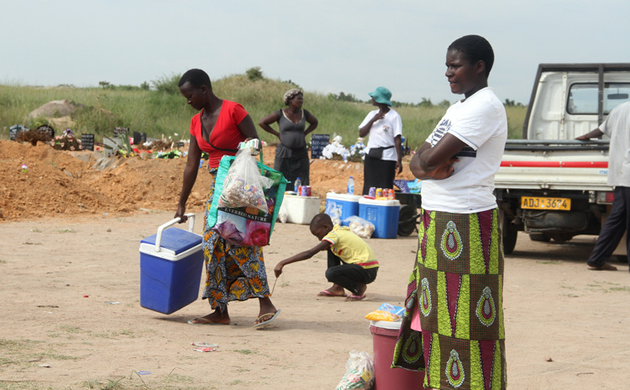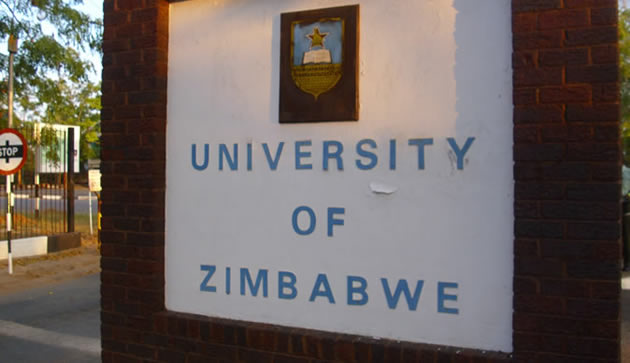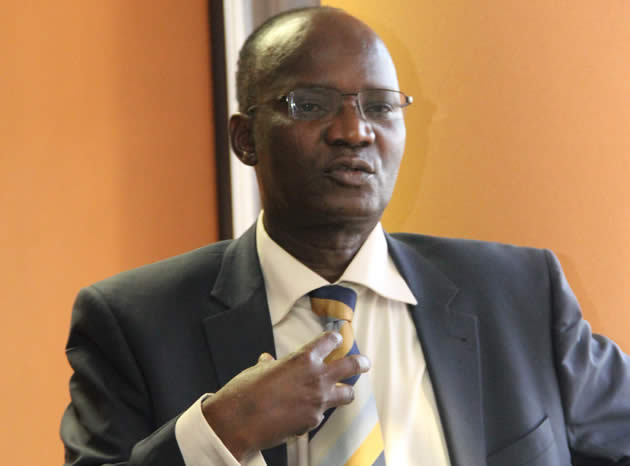Feeding off the dead


While cemeteries are considered sacred and largely reserved for rituals and activities for the dearly departed, this collage shows vendors who have turned Granville Cemetery, popularly known as kuMbudzi, into a market of choice. (Picture by William Mafunga)
Ruth Butaumocho Gender Editor
They have attended close to a thousand funerals of strangers. Each day, they are part of up to five funerals or more, yet they rarely shed a tear, doing so on a few occasions. They are neither grave diggers, undertakers, priests nor hearse drivers yet they make sure they do not miss a funeral.
Meet Vimbai Chasi (42) and her 24- year-old daughter (declined to be named) who have been vendors at Granville Cemetery popularly known as kuMbudzi.
Granville Cemetery is situated south of Harare along the Harare-Masvingo Road.
Ms Chasi and her daughter have been daily visitors to the cemetery for the past eight years. While cemeteries are often considered sacred and normally reserved for rituals and activities for the dearly departed, Granville is just their “office”.
Considered taboo to sell from a cemetery, Ms Chasi and her daughter have simply crossed the line.
For many vendors too, also selling different merchandise, particularly food, drink, beer and other cordials in search of the elusive dollar, death presents an opportunity to earn a living.
Most say business is good and profitable.
For people like Ms Chasi, a widow, money can be found anywhere.
“With my daughter’s help, we try to sell as many things as possible within the stipulated time of burial.
“It was actually my husband (now late) a grave digger who came up with the idea, because mourners, mainly men often approached him to inquire where they could buy drinks and cigarettes during burials,” said Ms Chasi, who lives in Hopley, a stone’s throw from the Granville Cemetery B section.
Initially, some mourners were reluctant to buy their wares, saying selling from cemeteries was uncultural and unheard of.
But of late, most vendors who started off selling soft drinks, snacks and cigarettes, have gone a notch higher and now stock different brands of beer, including the illicit “Bronco”, which is on demand.
The vendors also take special orders for cooked food, mbanje and even condoms.
Another vendor, Shupi Makanure (18), says although sales fluctuate, there is never a dry day where vendors go home empty-handed.
On a good day, cemetery vendors can make as much as $80.
Then there are bad days, when they make as little as $10.
Their sales are often determined by the lifestyle the deceased led before his or her death and the amount of wealth his or her relatives have.
Burials of commercial sex workers, armed robbers or other socialites within the same league, will guarantee vendors good sales irrespective of the type of wares they would be selling.
The flashier the casket and the expensively dressed the mourners would be, the higher the sales during the burial.
“The moment we see an expensive-looking hearse driving in accompanied by an entourage of equally expensive cars, we know we will have rich pickings for the day.
“It even gets better. If it’s a commercial sex worker, or an armed robber who is being buried mourners don’t usually bother about change because they are big spenders,” said Ms Chasi.
Because Ms Chasi and her daughter have spent the better part of their lives patronising Granville Cemetery, they have seen it all.
And of course, there have been a few instances when eulogies moved them to tears.
Ms Chasi says the rest have just been mere business encounters, where they transact with mourners to ensure that they make money in the least possible time.
“We have witnessed the burial of prominent people, and sometimes we would get carried away with the proceedings that we would momentarily forget about business.
“But generally, we stick to the core of our business, kufadza macustomer,” she said.
Since strategy is critical to business, Ms Chasi says the vendors also keep track of events on the dead to ascertain where big burials for prominent people will be taking place in Harare.
On one or two occasions, the pair has had to travel to Warren Hills and Unit L Cemetery in Chitungwiza for burials of prominent persons to maximise on their sales.
From city to city, battle lines over street vending are drown, where vendors sometimes clash among themselves over space or with the municipal police for selling their wares on undesignated places.
But this is something cemetery vendors don’t have to worry about, and neither do they lose sleep over overhead expenses, because there are none.
Their only overhead condition is the weather, which sometimes interrupts their business, when they have to look for shelter if there is a heavy downpour, or unexpected cold spell.
When leaving their homes to go to work every day, their daily prayer is to see more funeral hearses driving into the cemetery.
Harare City Council has since indicated that it will soon set vending sites around cemeteries.
Harare City Council principal communications officer, Mr Mike Chideme, said vending sites at cemeteries will be set up within reasonable distances that will not interfere with burial proceedings, as was the current scenario.
“The sites will be set up after other necessary infrastructure like toilets have been constructed. It is a programme that we are seriously looking into,” he said.
Vending in cemeteries is not common in Zimbabwe alone, but is increasingly becoming widespread in the region.
The Lusaka City Council (LCC) has been battling to remove traders and vendors from the graveyards, saying it was a health hazard to mourners and residents.
Only last week, LCC public relations manager Habeenzu Mulunda made a passionate plea to the government to assist the municipal authority in removing the traders and vendors from cemeteries but they were resisting the move, saying the development will throw them deep into poverty since they don’t have other sources of income, except vending.








Comments